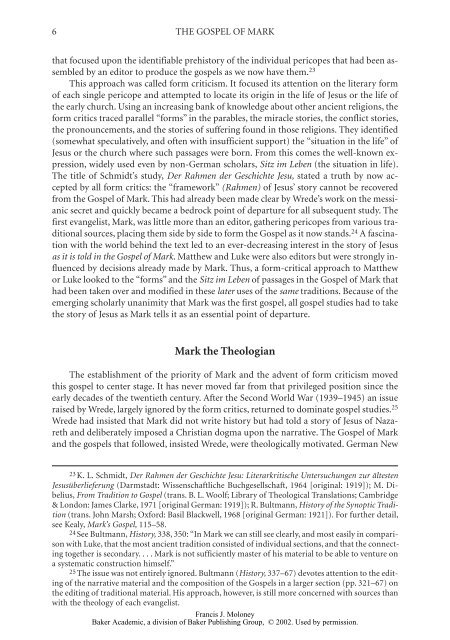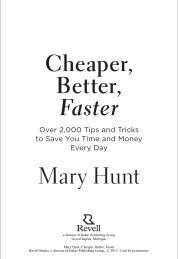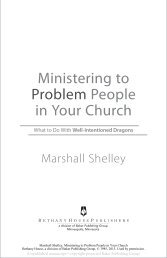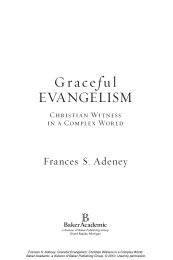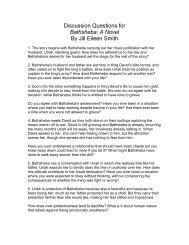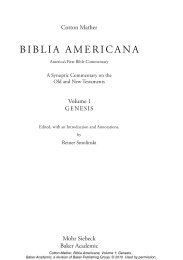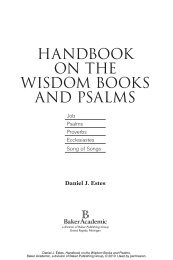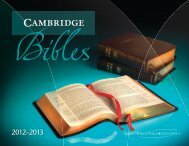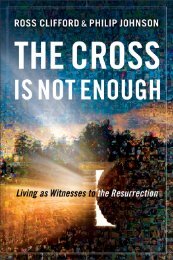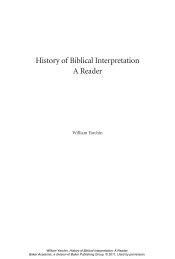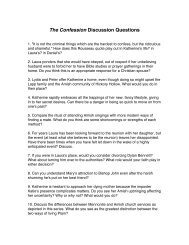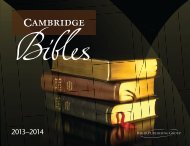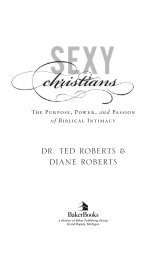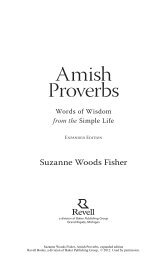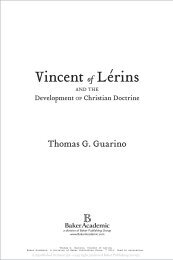the gospel of mark a commentary - Baker Publishing Group
the gospel of mark a commentary - Baker Publishing Group
the gospel of mark a commentary - Baker Publishing Group
Create successful ePaper yourself
Turn your PDF publications into a flip-book with our unique Google optimized e-Paper software.
6 THE GOSPEL OF MARK<br />
that focused upon <strong>the</strong> identifiable prehistory <strong>of</strong> <strong>the</strong> individual pericopes that had been assembledbyaneditortoproduce<strong>the</strong><strong>gospel</strong>saswenowhave<strong>the</strong>m.<br />
23<br />
This approach was called form criticism. It focused its attention on <strong>the</strong> literary form<br />
<strong>of</strong> each single pericope and attempted to locate its origin in <strong>the</strong> life <strong>of</strong> Jesus or <strong>the</strong> life <strong>of</strong><br />
<strong>the</strong> early church. Using an increasing bank <strong>of</strong> knowledge about o<strong>the</strong>r ancient religions, <strong>the</strong><br />
form critics traced parallel “forms” in <strong>the</strong> parables, <strong>the</strong> miracle stories, <strong>the</strong> conflict stories,<br />
<strong>the</strong> pronouncements, and <strong>the</strong> stories <strong>of</strong> suffering found in those religions. They identified<br />
(somewhat speculatively, and <strong>of</strong>ten with insufficient support) <strong>the</strong> “situation in <strong>the</strong> life” <strong>of</strong><br />
Jesus or <strong>the</strong> church where such passages were born. From this comes <strong>the</strong> well-known expression,<br />
widely used even by non-German scholars, Sitz im Leben (<strong>the</strong>situationinlife).<br />
The title <strong>of</strong> Schmidt’s study, Der Rahmen der Geschichte Jesu, stated a truth by now accepted<br />
by all form critics: <strong>the</strong> “framework” (Rahmen) <strong>of</strong> Jesus’ story cannot be recovered<br />
from <strong>the</strong> Gospel <strong>of</strong> Mark. This had already been made clear by Wrede’s work on <strong>the</strong> messianic<br />
secret and quickly became a bedrock point <strong>of</strong> departure for all subsequent study. The<br />
first evangelist, Mark, was little more than an editor, ga<strong>the</strong>ring pericopes from various traditional<br />
sources, placing <strong>the</strong>m side by side to form <strong>the</strong> Gospel as it now stands. 24 Afascination<br />
with <strong>the</strong> world behind <strong>the</strong> text led to an ever-decreasing interest in <strong>the</strong> story <strong>of</strong> Jesus<br />
as it is told in <strong>the</strong> Gospel <strong>of</strong> Mark. Mat<strong>the</strong>wandLukewerealsoeditorsbutwerestronglyinfluenced<br />
by decisions already made by Mark. Thus, a form-critical approach to Mat<strong>the</strong>w<br />
or Luke looked to <strong>the</strong> “forms” and <strong>the</strong> Sitz im Leben <strong>of</strong> passages in <strong>the</strong> Gospel <strong>of</strong> Mark that<br />
hadbeentakenoverandmodifiedin<strong>the</strong>selater uses <strong>of</strong> <strong>the</strong> same traditions. Because <strong>of</strong> <strong>the</strong><br />
emerging scholarly unanimity that Mark was <strong>the</strong> first <strong>gospel</strong>, all <strong>gospel</strong> studies had to take<br />
<strong>the</strong> story <strong>of</strong> Jesus as Mark tells it as an essential point <strong>of</strong> departure.<br />
Mark <strong>the</strong> Theologian<br />
Theestablishment<strong>of</strong><strong>the</strong>priority<strong>of</strong>Markand<strong>the</strong>advent<strong>of</strong>formcriticismmoved<br />
this <strong>gospel</strong> to center stage. It has never moved far from that privileged position since <strong>the</strong><br />
early decades <strong>of</strong> <strong>the</strong> twentieth century. After <strong>the</strong> Second World War (1939–1945) an issue<br />
raised by Wrede, largely ignored by <strong>the</strong> form critics, returned to dominate <strong>gospel</strong> studies. 25<br />
Wrede had insisted that Mark did not write history but had told a story <strong>of</strong> Jesus <strong>of</strong> Nazareth<br />
and deliberately imposed a Christian dogma upon <strong>the</strong> narrative. The Gospel <strong>of</strong> Mark<br />
and <strong>the</strong> <strong>gospel</strong>s that followed, insisted Wrede, were <strong>the</strong>ologically motivated. German New<br />
23K. L. Schmidt, Der Rahmen der Geschichte Jesu: Literarkritische Untersuchungen zur ältesten<br />
Jesusüberlieferung (Darmstadt: Wissenschaftliche Buchgesellschaft, 1964 [original: 1919]); M. Dibelius,<br />
From Tradition to Gospel (trans. B. L. Woolf; Library <strong>of</strong> Theological Translations; Cambridge<br />
& London: James Clarke, 1971 [original German: 1919]); R. Bultmann, History <strong>of</strong> <strong>the</strong> Synoptic Tradition<br />
(trans. John Marsh; Oxford: Basil Blackwell, 1968 [original German: 1921]). For fur<strong>the</strong>r detail,<br />
see Kealy, Mark’s Gospel, 115–58.<br />
24See Bultmann, History, 338, 350: “In Mark we can still see clearly, and most easily in comparison<br />
with Luke, that <strong>the</strong> most ancient tradition consisted <strong>of</strong> individual sections, and that <strong>the</strong> connecting<br />
toge<strong>the</strong>r is secondary. . . . Mark is not sufficiently master <strong>of</strong> his material to be able to venture on<br />
a systematic construction himself.”<br />
25The issue was not entirely ignored. Bultmann (History, 337–67) devotes attention to <strong>the</strong> editing<br />
<strong>of</strong> <strong>the</strong> narrative material and <strong>the</strong> composition <strong>of</strong> <strong>the</strong> Gospels in a larger section (pp. 321–67) on<br />
<strong>the</strong> editing <strong>of</strong> traditional material. His approach, however, is still more concerned with sources than<br />
with <strong>the</strong> <strong>the</strong>ology <strong>of</strong> each evangelist.<br />
Francis J. Moloney<br />
<strong>Baker</strong> Academic, a division <strong>of</strong> <strong>Baker</strong> <strong>Publishing</strong> <strong>Group</strong>, © 2002. Used by permission.


